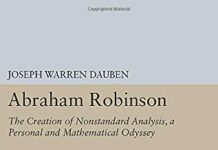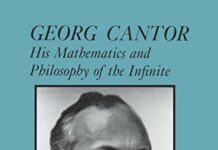
Ebook Info
- Published: 1990
- Number of pages: 404 pages
- Format: PDF
- File Size: 61.45 MB
- Authors: Joseph Warren Dauben
Description
One of the greatest revolutions in mathematics occurred when Georg Cantor (1845-1918) promulgated his theory of transfinite sets. This revolution is the subject of Joseph Dauben’s important studythe most thorough yet writtenof the philosopher and mathematician who was once called a “corrupter of youth” for an innovation that is now a vital component of elementary school curricula. Set theory has been widely adopted in mathematics and philosophy, but the controversy surrounding it at the turn of the century remains of great interest. Cantor’s own faith in his theory was partly theological. His religious beliefs led him to expect paradoxes in any concept of the infinite, and he always retained his belief in the utter veracity of transfinite set theory. Later in his life, he was troubled by recurring attacks of severe depression. Dauben shows that these played an integral part in his understanding and defense of set theory.
User’s Reviews
Editorial Reviews: Review “Historians of mathematics can only be grateful for the effort Professor Dauben has expended to create the synthesis of Cantor scholarship found in this book. But the book can, and I hope will, be read with profit by a far more extensive audience. Any student, mathematician, philosopher, theologian, or general historian with an interest in Georg Cantor and the wondrous revolution in mathematical and philosophical thought that his work did so much to precipitate will find this book of considerable interest.”—Thomas Hawkins, Historia Mathematica”Joseph Warren Dauben, Winner of the 2012 Albert Leon Whiteman Memorial Prize, American Mathematical Society” From the Back Cover One of the greatest revolutions in mathematics occurred when Georg Cantor promulgated his theory of tranfinite sets. This revolution is the subject of Joseph Dauben’s important study–the most thorough yet written–of the philosopher and mathematician who was once called a ‘corrupter of youth’ for an innovation that is now a vital component of elementary school curricula.
Reviews from Amazon users which were colected at the time this book was published on the website:
⭐This is a great book on the work of Georg Cantor.The new millennium brought forth a new human hope — to unify `that which is physical’ with `that which is spiritual.’ This hope would unify the fields of science and theology. Currently, these fields are separated by their different beliefs and methods of truth seeking. On beliefs, many scientists do not believe in God whereas all theologians believe in God. On truths, scientists use the scientific method to express true scientific statements whereas theologians use feelings, phenomena, and scriptures to express true theological statements.I believe that all `big discoveries’ unify ‘that which is physical’ with ‘that which is spiritual.’ For instance, the big discovery of Nicholas of Cusa unifies an infinite God and our finite universe. And, the big discovery of Leibniz unifies spiritual atoms with all physical things in the universe. Further, the big 1920 discovery of symbolic languages allows us to speak about God and the universe using the same symbolic language. In this book on Cantor, one earns that the mathematics and infinities of Georg Cantor is another `big discovery’ that unifies God and the universe.Cantor’s theory of the infinity reveals two infinities. One is the `non-genuine’ infinite. This infinity is incomplete. It applies to variable magnitudes in the universe, as they either grow beyond all limits or diminishes to an arbitrary smallness. This infinity always remains finite. Cantor’s transfinite numbers orders and counts all non-genuine infinities. On the other hand, the `genuine’ infinity is determinate, unchanging, and complete. It is found in the complex variables used by scientists. There, the determinate infinity is the single point at infinity. Complex variables in the neighborhood of this single point are thus analytical. The genuine infinity is also used by theologians to represent God.It is obvious that organized research on these big discoveries must be increased considerably by all nations. To start organizing this research effort, I am writing a book on symbolic languages and the big discoveries of Cusa, Leibniz, and Cantor.
⭐Interesting read.
⭐I’ve just been rereading parts of this book in order to get clearer about how it was possible for Cantor to work for many years, and always with great rigor, on the ordering of the transfinite ordinals and yet still continue to reject, quite dogmatically in general, the existence of infintesimals, or “granulars” as they are sometimes called, and to do so despite numerous explications and/or personal letters from Thomae, du Bois-Reymond, Stolz, Veronese and Vivendi [not to mention Peirce and Weyl, who had no direct contact with Cantor] all of which argued — in my view quite correctly — that admitting the legitimacy of the transfinite ordinals immediately implied the existence of the infintesimals as well. Dauben does an admirable job of showing why and how Cantor went about trying to exclude what he calls the “Chorela-Bacillus of infintestimals” with which he believed — wrongly as it turns out, since Leibniz and several others had already developed Real Analysis and the Calculus on the basis of such quantities — Thomae had first “infected” mathematics. Obviously this is one of Cantor’s most egregious errors, something which is easy to see from our perspective today, especially after Abraham Robinson’s rigorous theorization of Non-Standard Analysis, and which ought — I believe — to have been fairly obvious to Cantor at the time, especially since so many other leading mathematicians of his day were lining up against him on the issue and providing serious arguments to counter his own dogmatic “immunization strategies” and the subsequent digging in of his heels. At any rate, Dauben explains all of this infintesimal denial very clearly in this biographically organized presentation of Cantor’s seminal mathematical [and, albeit to a lesser extent, philosophical] insights and theorizations. All in all I would certainly give this work the full 5 stars of praise!
Keywords
Free Download Georg Cantor: His Mathematics and Philosophy of the Infinite 1st Edition in PDF format
Georg Cantor: His Mathematics and Philosophy of the Infinite 1st Edition PDF Free Download
Download Georg Cantor: His Mathematics and Philosophy of the Infinite 1st Edition 1990 PDF Free
Georg Cantor: His Mathematics and Philosophy of the Infinite 1st Edition 1990 PDF Free Download
Download Georg Cantor: His Mathematics and Philosophy of the Infinite 1st Edition PDF
Free Download Ebook Georg Cantor: His Mathematics and Philosophy of the Infinite 1st Edition

